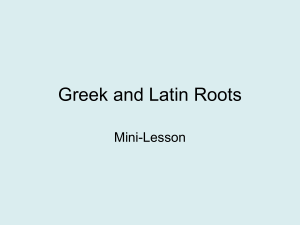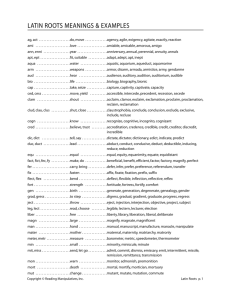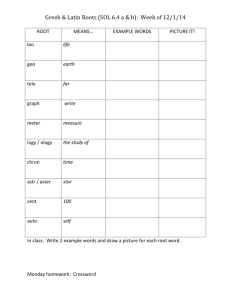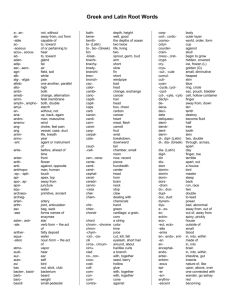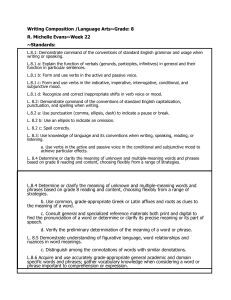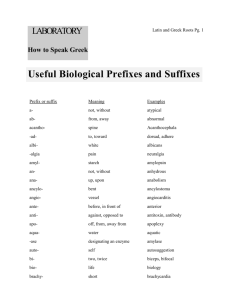Greek & Latin Roots Vocabulary Assessment
advertisement
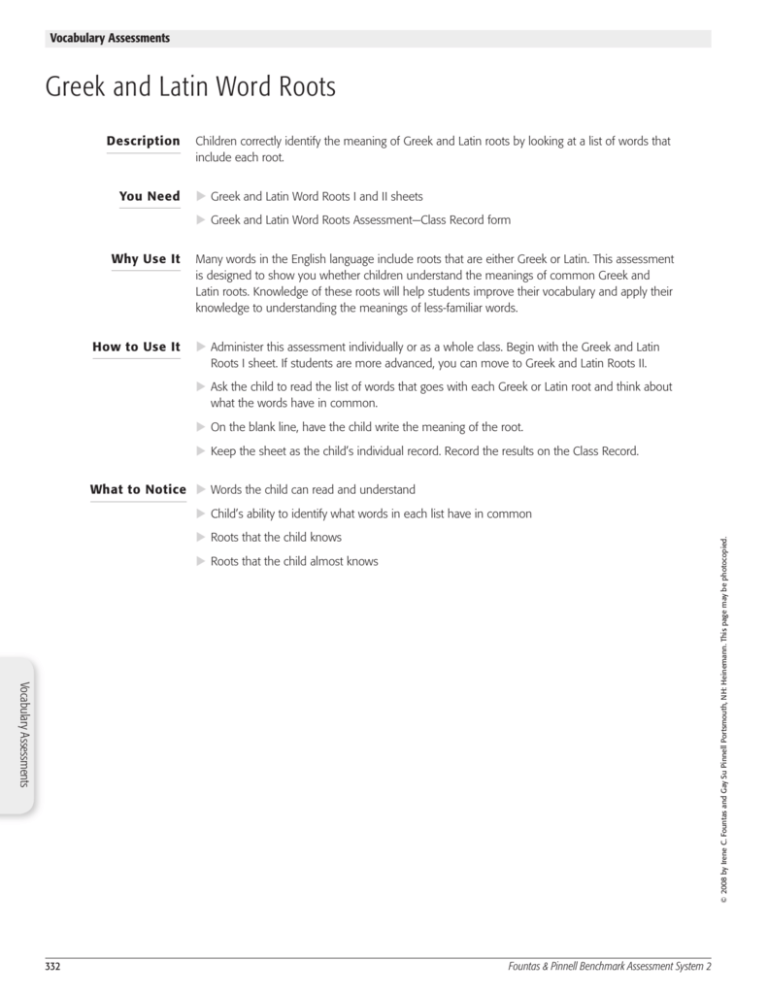
Vocabulary Assessments Greek and Latin Word Roots Description Children correctly identify the meaning of Greek and Latin roots by looking at a list of words that include each root. You Need u Greek and Latin Word Roots I and II sheets u Greek and Latin Word Roots Assessment—Class Record form Why Use It Many words in the English language include roots that are either Greek or Latin. This assessment is designed to show you whether children understand the meanings of common Greek and Latin roots. Knowledge of these roots will help students improve their vocabulary and apply their knowledge to understanding the meanings of less-familiar words. How to Use It u Administer this assessment individually or as a whole class. Begin with the Greek and Latin Roots I sheet. If students are more advanced, you can move to Greek and Latin Roots II. u Ask the child to read the list of words that goes with each Greek or Latin root and think about what the words have in common. u On the blank line, have the child write the meaning of the root. u Keep the sheet as the child’s individual record. Record the results on the Class Record. W hat to Notice u Words the child can read and understand u Child’s ability to identify what words in each list have in common © 2008 by Irene C. Fountas and Gay Su Pinnell Portsmouth, NH: Heinemann. This page may be photocopied. u Roots that the child knows u Roots that the child almost knows Vocabulary Assessments 332 Fountas & Pinnell Benchmark Assessment System 2 Vocabulary Assessments Greek and Latin Word Roots I 1.What does the Latin root -ped- mean in these words? pedal, pedestrian, pedestal, biped ______________________________________________ 2.What does the Greek root –mon- mean in these words? monocle, monarch, monochromatic, monogram ______________________________________________ 3.What does the Greek root -phon- mean in these words? phonograph, symphony, telephone, phonics, saxophone ______________________________________________ 4.What does the Latin root -vis- mean in these words? vision, revise, visible, visit ______________________________________________ ______________________________________________ 6.What does the Greek root -therm- mean in these words? thermometer, thermal, thermostat, thermos Vocabulary Assessments © 2008 by Irene C. Fountas and Gay Su Pinnell Portsmouth, NH: Heinemann. This page may be photocopied. 5.What does the Latin root -port- mean in these words? portable, transport, import, export ______________________________________________ Fountas & Pinnell Benchmark Assessment System 2 333 Vocabulary Assessments Greek and Latin Word Roots II 1.What does the Latin root -ject- mean in these words? project, inject, projectile, reject ______________________________________________ 2.What does the Greek root -chron- mean in these words? chronological, synchronize, chronicle, chronic ______________________________________________ 3.What does the Latin root -terr- mean in these words? terrestrial, territory, terrain, terrace ______________________________________________ 4.What does the Greek root -phil- mean in these words? philosophy, philanthropist, philharmonic, bibliophile 5.What does the Greek root -phob- mean in these words? claustrophobia, xenophobic, aquaphobia, arachnophobia ______________________________________________ Vocabulary Assessments 6.What does the Latin root -duct- mean in these words? conduct, viaduct, abduct, aqueduct ______________________________________________ 334 Fountas & Pinnell Benchmark Assessment System 2 © 2008 by Irene C. Fountas and Gay Su Pinnell Portsmouth, NH: Heinemann. This page may be photocopied. ______________________________________________ © 2008 by Irene C. Fountas and Gay Su Pinnell Portsmouth, NH: Heinemann. This page may be photocopied. Vocabulary Assessments Name Fountas & Pinnell Benchmark Assessment System 2 -duct- (lead) -phob- (fear) -phil- (love) -terr- (land, earth) -chron- (time) -ject- (throw) -therm- (heat) -port- (carry) -vis- (see) -phon- (sound) -mon- (one, alone) -ped- (foot) Vocabulary Assessments Greek and Latin Word Roots I and II—Class Record 335

